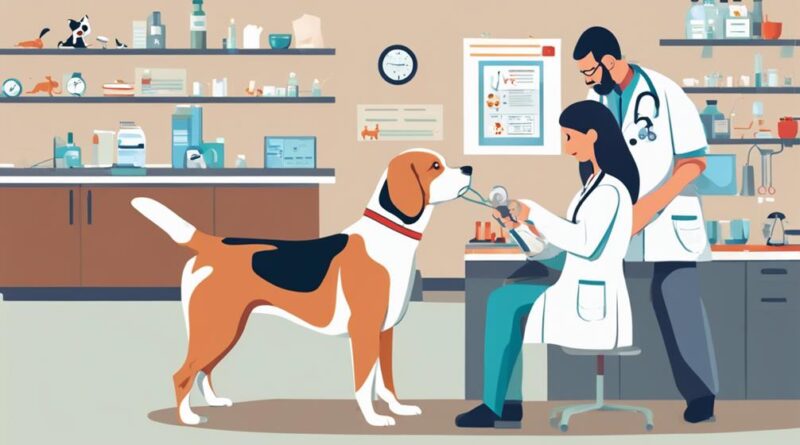7 Tips to Combat Most Common Canine Diseases
Combat the most common canine diseases proactively. Watch for early symptoms like changes in behavior or appearance. Stick to a proper vaccination plan to boost immunity. Regular vet visits are key for catching issues early on. Feed a balanced diet and keep your dog active. Control parasites with vet-recommended products. Know breed-specific risks to protect your pup. By taking these steps, you're ensuring your furry friend's health and happiness.
Recognizing Symptoms Early
To catch canine diseases early, pay close attention to any changes in your dog's behavior or appearance. Early intervention is key when it comes to the health of your furry friend. Your dog can't tell you when they're feeling unwell, so it's crucial to be vigilant for any signals that something might be wrong. Keep an eye out for subtle changes in their eating habits, energy levels, or bathroom routines. These can be crucial signals that prompt timely treatment and preventative measures.
If you notice your dog acting lethargic, refusing to eat, or experiencing sudden weight loss, these could be signs of an underlying health issue. Changes in their coat quality, skin condition, or the presence of lumps and bumps should also not be ignored. By catching these symptoms early on, you can seek veterinary care promptly, potentially avoiding more serious complications down the line.
Regular check-ups with your vet can also help in detecting any issues early. Make sure your dog is up to date on their vaccinations and parasite prevention to reduce the risk of certain illnesses. Remember, your furry companion relies on you to advocate for their well-being, so staying alert to any changes and seeking prompt medical attention can make a world of difference in their health and happiness.
Proper Vaccination Schedule
Ensuring your dog follows a proper vaccination schedule is essential for safeguarding their health and well-being. Vaccines are crucial in preventing various diseases that can be harmful to your furry friend. By staying up to date with vaccinations, you enhance your dog's immune system and protect them from potential outbreaks.
Vaccine effectiveness is a key factor in maintaining your dog's health. Vaccines work by stimulating your dog's immune system to produce antibodies that fight off specific diseases. This preparation helps your dog combat these illnesses more effectively if they're ever exposed to them. However, for vaccines to be truly effective, they need to be administered on a proper schedule. Missing vaccinations or not following the recommended timing can leave your dog vulnerable to diseases.
Proper vaccination not only shields your dog from individual health risks but also plays a significant role in preventing outbreaks within the dog community. By vaccinating your pet, you contribute to the overall well-being of all dogs by reducing the likelihood of diseases spreading. This community-wide protection is especially crucial in places where dogs frequently interact, such as parks, boarding facilities, or training classes.
Regular Veterinary Check-ups
Make sure to schedule regular veterinary check-ups for your dog to maintain their overall health and catch any potential issues early on. Preventive care is crucial in keeping your furry friend healthy and happy. Just like humans, dogs benefit greatly from routine check-ups to monitor their well-being and address any emerging concerns promptly.
Regular veterinary check-ups play a vital role in the early detection of diseases or health issues in your dog. Veterinarians are trained to spot subtle signs that might go unnoticed by pet owners. Through physical examinations, blood tests, and other diagnostic procedures, they can identify potential problems in their initial stages. This early detection can significantly improve treatment outcomes and prevent conditions from worsening.
Apart from detecting health issues early, these check-ups also help in establishing a baseline for your dog's health. By monitoring parameters like weight, heart rate, and blood work over time, veterinarians can track any deviations and intervene if necessary. This proactive approach ensures that your dog receives timely care and appropriate interventions, ultimately leading to a better quality of life.
Maintaining a Healthy Diet
Maintaining a healthy diet for your canine companion is essential for their overall well-being and longevity. Just like humans, dogs require a balanced diet to stay healthy. To ensure your furry friend gets the necessary nutrients, consider incorporating nutritional supplements into their meals. These supplements can help address specific health concerns or fill in any gaps that may be present in their regular diet.
Portion control is another crucial aspect of maintaining a healthy diet for your dog. Overfeeding can lead to obesity and other health issues, while underfeeding can result in malnourishment. It's important to follow feeding guidelines based on your dog's size, age, and activity level. Consulting with your veterinarian can help you determine the right portion sizes for your canine companion.
When selecting food for your dog, opt for high-quality options that are free from artificial additives and fillers. Look for products that list a high-quality protein source as the first ingredient. Additionally, consider rotating your dog's food occasionally to provide variety and ensure they receive a wide range of nutrients.
Providing Adequate Exercise
To keep your furry friend healthy and happy, ensuring they get enough exercise is crucial. Regular physical activity isn't only essential for preventing obesity in dogs but also provides mental stimulation that's vital for their overall well-being. Just like humans, dogs need to move their bodies to stay in good shape and maintain a healthy weight.
Exercise helps prevent obesity in dogs by burning calories and keeping their metabolism active. A sedentary lifestyle can lead to weight gain, which in turn increases the risk of various health issues such as diabetes, joint problems, and heart disease. By engaging your dog in regular exercise routines, you can help them stay fit and healthy.
In addition to preventing obesity, exercise also plays a crucial role in providing mental stimulation for your furry companion. Dogs are intelligent animals that require mental challenges to keep their minds sharp and active. Activities such as interactive play, obedience training, and puzzle toys can help stimulate your dog's brain and prevent boredom.
Controlling Parasites Effectively
Controlling parasites in your canine companion is essential for maintaining their health and well-being. Parasites can cause discomfort, illness, and even serious health issues for your furry friend.
Here are some practical tips to help you effectively combat parasites:
- Regular Veterinary Check-ups: Schedule routine check-ups with your veterinarian to monitor your dog's health and discuss preventative measures against parasites.
- Flea and Tick Prevention: Use vet-recommended flea and tick preventatives to protect your dog from these common parasites. Regular grooming and maintaining a clean living environment can also help in this regard.
- Heartworm Prevention: Administer heartworm preventatives as prescribed by your vet. Heartworm disease can be fatal if left untreated, so prevention is key.
- Holistic Treatments: Explore holistic treatments like natural parasite repellents or herbal remedies. Consult your vet before trying any holistic approach to ensure it's safe and effective for your dog.
Understanding Breed-Specific Risks

Understanding breed-specific risks is crucial for safeguarding your canine companion's health and well-being. Genetic predispositions play a significant role in determining which diseases or conditions certain breeds are more susceptible to. By being aware of these genetic predispositions, you can take proactive measures to protect your furry friend.
Different breeds have unique characteristics that make them prone to specific health issues. For example, large breeds like Great Danes are more likely to develop joint problems such as hip dysplasia, while brachycephalic breeds like Bulldogs may face respiratory issues due to their flat faces. Knowing these breed-specific risks allows you to anticipate potential health concerns and take appropriate breed-specific precautions.
Regular vet check-ups are essential for monitoring your dog's health and catching any potential issues early on. Your veterinarian can provide guidance on breed-specific risks and recommend preventative measures or screenings to keep your canine companion healthy. Additionally, maintaining a balanced diet, providing regular exercise, and ensuring your dog receives proper grooming and dental care are all crucial components of preventing breed-specific health issues.
Frequently Asked Questions
Can My Dog's Behavior Change if They Are Sick?
If your dog is sick, their behavior can change. Illness often leads to behavioral changes in dogs. Symptoms of sickness may include lethargy, loss of appetite, unusual aggression, or excessive whining.
Paying attention to these signs and seeking veterinary care promptly is crucial. Your furry friend relies on you to notice these behavioral shifts and help them feel better.
Be attentive and responsive to ensure your dog gets the care they need when they're not feeling well.
How Do I Know if My Dog Is Allergic to a Vaccine?
If your dog is allergic to a vaccine, they might show vaccine reactions like swelling, itchiness, or hives. Allergy symptoms can also include vomiting, diarrhea, or difficulty breathing.
Contact your vet immediately if you notice any of these signs after vaccination. It's important to seek prompt care to address any allergic reactions and ensure your dog's health and safety.
What Are the Signs of Dehydration in Dogs?
Recognizing symptoms of dehydration in dogs is crucial to their well-being. Watch out for signs like excessive panting, dry gums, and lethargy.
Preventing dehydration involves ensuring your pup has access to fresh water at all times, especially during hot weather or after vigorous exercise. Keep an eye on their water intake and seek veterinary care if you suspect dehydration.
Your quick action can help keep your furry friend healthy and happy.
Is It Normal for My Dog to Have Occasional Diarrhea?
Having occasional diarrhea in dogs can be normal due to dietary adjustments or stress. Ensure your furry friend stays hydrated.
Consider incorporating probiotics to support gut health. If diarrhea persists, consult your vet.
Are There Any Natural Remedies for Common Canine Diseases?
When it comes to common canine diseases, natural treatments can be a great option. Taking a holistic approach to your dog's health can involve using herbs, supplements, or even dietary changes to support their immune system and overall well-being.
Consulting with a holistic veterinarian can help you create a customized plan tailored to your furry friend's specific needs. Remember, natural remedies can be a gentle and effective way to keep your pup healthy.
Conclusion
Remember, your furry friend relies on you to keep them healthy and happy. By recognizing symptoms early, following a proper vaccination schedule, and maintaining regular vet check-ups, you can combat common canine diseases effectively.
Providing a healthy diet, enough exercise, controlling parasites, and understanding breed-specific risks are all crucial steps in ensuring your dog's well-being.
Stay informed, stay proactive, and give your pup the best chance at a long and healthy life.
